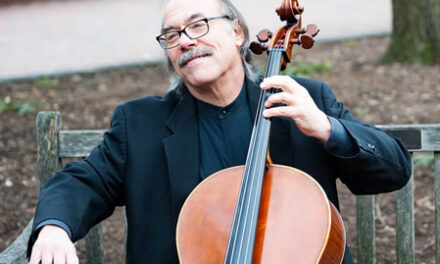A delightful summer breeze welcomed a large crowd to Cary’s Koka Booth Amphitheater for the concluding concert of the North Carolina Symphony’s “Summerfest 2013″ series. Conductor William Henry Curry’s program opened with excerpts from operas, beginning with Giuseppe Verdi’s Overture to La forza del destino. For this and a number of other works in this concert, Curry chose fast tempos, likely due to the absence of an effective acoustic shell and any reverberation. This led to some sloppy triplets in the Overture’s bass parts.
For the second Verdi excerpt, the “Anvil Chorus” from Il Trovatore, the orchestra was joined by the Concert Singers of Cary. Singing in English, the singers had problems staying on the beat and negotiating the upper registers of Verdi’s soprano and tenor lines.
Three more opera excerpts, this time from the pen of Richard Wagner, followed: the Prelude to Die Meistersinger von Nürnberg, the Prelude to Act III of Lohengrin, and that opera’s “Bridal Chorus.” Curry’s rapid tempi worked better for the Lohengrin prelude than for Meistersinger, which lacked the grandeur normally evoked by this prelude.
After two well-played movements from Georg Frederic Handel’s Music for the Royal Fireworks, the concert’s first half concluded with that composer’s “Hallelujah Chorus,” from the oratorio Messiah. The singers fell into the ever-present trap of this chorus: mis-pronouncing the final syllable of “hallelujah” as an almost-staccato “yuh,” rather than a full eighth-note “yah.” Especially when miked and broadcast over speakers, as is the case with these outdoor concerts, the result is not a pleasing sound. Perhaps the chorus was simply having an ‘off night,’ since they battled intonation problems and impure vowel sounds for most of the evening.
The program’s second half began with two movements from Léo Delibes’ Coppélia ballet. While the Czardas was pedestrian, the Final Galop was appropriately spirited. After an entertaining introduction by Maestro Curry, which closed with “And please, people, this is Cary: no rioting!” the orchestra paid homage to the 100th anniversary of Igor Stravinsky’s Le Sacre du Printemps (“The Rite of Spring”) with an energetic reading of the “Dance of the Young Girls.”
The evening concluded with Peter Wilhousky’s well-known arrangement of the “Battle Hymn of the Republic” and Pyotr Tchaikovsky’s Op. 49, the famous “1812 Overture,” which has become a standard for orchestral concerts around the U.S. Independence Day celebrations. Since it has nothing at all to do with July 4th (it celebrates the Russian victory over Napoleon’s French army in 1812), its adoption by so many USA orchestras must simply be because it’s fun music to hear, with its exciting tunes, cannon, and bells. It’s time for an American composer to rise to the occasion and score a “1776 Overture” for the same forces. There should, however, be a note in the score saying that recorded cannon fire (as was heard in this performance) should be avoided. The chorus redeemed itself in the choral parts of the “1812,” singing the folk song and hymn settings not only in Russian, but with good intonation, balance, and élan.











